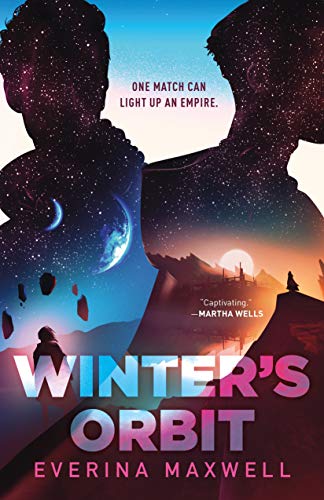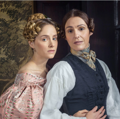Cassidy Percoco reviewed Winter's Orbit by Everina Maxwell
Review of "Winter's Orbit" on 'Goodreads'
5 stars
This book is, honestly, extraordinary.
When I started it, I did think more intro was needed. There was a lot of “as you know, Bob” in the first chapter and I just let it wash over me without trying to understand the worldbuilding going on in the dialogue. And I continued reading.
Very soon, I decided that the book must have been originally a fanfiction that got the serial numbers filed off – it was familiar, and the sudden start almost presumed you already knew the characters. Imagine my delight when I realized that it is indeed original fiction, but the very first drafts were posted to a fannish forum I frequented at the time, where I’m fairly sure I read and commented on a few of them! Obviously, this only predisposed me further to it.
What’s extraordinary to me is the fact that in 2021 we can actually have …
This book is, honestly, extraordinary.
When I started it, I did think more intro was needed. There was a lot of “as you know, Bob” in the first chapter and I just let it wash over me without trying to understand the worldbuilding going on in the dialogue. And I continued reading.
Very soon, I decided that the book must have been originally a fanfiction that got the serial numbers filed off – it was familiar, and the sudden start almost presumed you already knew the characters. Imagine my delight when I realized that it is indeed original fiction, but the very first drafts were posted to a fannish forum I frequented at the time, where I’m fairly sure I read and commented on a few of them! Obviously, this only predisposed me further to it.
What’s extraordinary to me is the fact that in 2021 we can actually have a novel centering on a tropey m/m romance with an HEA published by a mainstream publisher and marketed as sf/f. It’s not segregated into some minor imprint for queer romance, it’s not put into the YA zone. It’s adult sf/f. Even though the romance is strong, we are acknowledging the plot and not pretending that because it explores emotional situations normally left to unvalued fanfiction, it’s “trashy”.
But don’t get me wrong – I don’t just value the book for its symbolic value. It’s a fantastic read. I found myself wishing I didn’t have to go to work so I could read more in the mornings, regretfully putting in a bookmark and going to bed on time at night to save chapters for the next day.
The plot: Prince Kiem is informed by the Emperor that he will be marrying Count Jainan for a political treaty. Kiem is initially very concerned for Jainan’s feelings, as Jainan’s partner (also a political marriage) died just a month ago. Jainan is also very concerned about how he’s imposing on Kiem, what a nuisance he must be, etc. (No prizes for figuring out who spent the last five years emotionally abusing him.) Gradually, as the two handle their diplomatic duties and work to investigate Jainan’s partner’s death, they fall in love, though they deny their feelings until they’re put in danger and have to act on them.
The progress of Kiem and Jainan’s relationship is deeply compelling. While hurt/comfort isn’t restricted to fanfiction (we can see it in published fiction from A Little Princess to Outlander) and the marriage-of-convenience-but-we’re-falling-in-love is a staple historical romance plot, Maxwell delves into the emotions of the situation in a way that people outside of fandom just … don’t. It’s unseemly to do this outside of the romance genre, and in romance there is much more emphasis placed on the physical and erotic aspect of the relationship. (More on this in a minute.) It’s so refreshing to read the delicate dance of these two characters in a published work of fiction. Both are worried about forcing intimacy on the other, but their attempts to stand back and diminish their wants and needs read as dislike to each other; the misunderstanding is fed from their mutual kindness and concern. This makes sense, and is much better than the stereotypical “I hate him, he’s so annoying! But my treacherous body is so attracted to him!” romance plot.
So, what I was saying about romance above. Historical romance, as a genre, is overwhelmingly heterosexual and dominated by formula. (Which is fine! If you like it, you like it, and I used to like it very much.) I read a post on Tumblr a little while ago that helped me understand something I love about all the m/m and f/f fanfiction and non-professionally-published fiction I read: heterosexual romance often feels like the author is referring to a checklist of secondary sexual characteristics that the characters are required to admire, but queer romance, because it does not have such a culturally-defined script, tends to acknowledge the individualism and reality of attraction. Think of the discourse going around about female characters depicted for the male gaze in League of Legends vs. for the female/queer gaze in Arcane. In heterosexual historical romance novels – and I know I keep going back to historical romance but the kind of dramatic, formal situation in Winter’s Orbit is something you don’t tend to see outside of that subgenre – you are very much aware of the main characters’ femininity and masculinity in the way that their attractiveness is described; the hero is always noted for his masculinity and even if the heroine is imperfectly feminine by societal standards, the hero will notice her femininity, sometimes pointing it out to her. By contrast, in Winter’s Orbit there is very little physicality. We have no idea what Kiem and Jainan look like beyond a few basics about their overall sizes and their hair, and while they have sex and recognize each others’ attractiveness, the focus is on how they act toward and for each other, as well as ungendered aspects of their persons. This extends to the entire book: gender is performed through social rituals (wearing a particular material, tying a scarf a certain way, etc.) and outside of these rituals, people do not gender each other. There is no tie between “biological sex” (to use the TERF term) and gender, to such an extent that secondary sexual characteristics are never mentioned. There is no indication that they relate at all to anyone’s self-determined gender or gender presentation. This feels very deliberate to me, especially when you consider that the two protagonists are only indicated with silhouettes on the cover, and it’s fantastic – both for the act of imagining a world where gender is understood in this way, and for what it does to the romance.
The one place this gender neutrality breaks down to me is that all titles that can be gendered use the masculine version (e.g. Prince). This isn’t bad, per se, but it’s not actually neutral. It might have been a better choice to either make up gender-neutral versions (Prins? Empero?) or to make use of the traditional feminine titles as other ranks.

